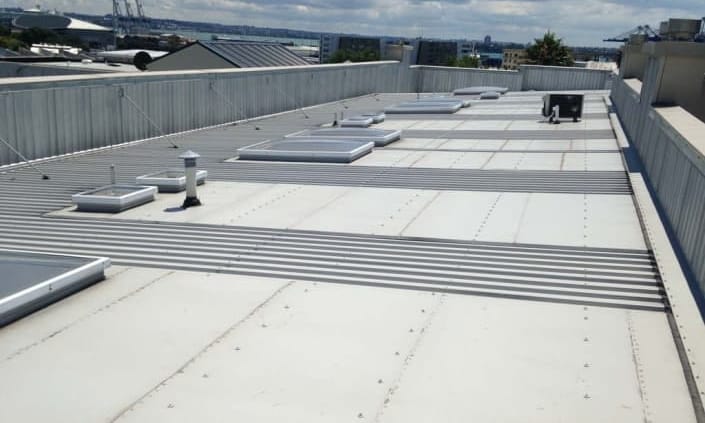Commercial Roof Replacement NJ: Top Tips for 2024 Success
Understanding Commercial Roof Replacement in NJ

For businesses and property owners, commercial roof replacement nj is a crucial investment. Whether you own a retail store, warehouse, or an office building, the integrity of your roof is vital to the safety and functionality of your property.
Quick overview for commercial roof replacement nj:
- Common Roof Types: EPDM, TPO, Metal Roofing
- Major Cost Factors: Roof size, material choice, labor costs
- Typical Benefits: Increased durability, better energy efficiency, safety compliance
Replacing a commercial roof is more than swapping out old shingles for new ones. It carries significant importance due to the need for durability, compliance with safety codes, and the functionalities of your commercial operations. Proper maintenance and timely replacements can prevent costly damages and ensure the longevity of your investment.
I’m Jimmy Hertilien, with experience in construction management and commercial roofing projects. My background ensures that you get a well-rounded perspective on commercial roof replacement nj. Let’s dig deeper into what you should know and consider before starting on such an important project.

Factors Affecting Commercial Roof Replacement Costs
When planning a commercial roof replacement in NJ, several factors will influence the overall cost. Understanding these elements can help you budget effectively and avoid surprises.
Size of the Roof
Roof size is one of the most significant cost factors. Larger roofs require more materials and labor, increasing the overall expense. For example, replacing the roof of a 10,000 sq. ft. warehouse will be more costly than a smaller 2,000 sq. ft. retail store.
Slope of the Roof
The slope or pitch of your roof also affects costs. Steeper roofs are more challenging to work on and may require special equipment, which can drive up labor costs. Most commercial roofs are flat or low-slope, but if your building has a steeper slope, expect to pay more.
Material Choice
The type of roofing material you choose will significantly impact the cost. Here are some common options:
- EPDM Flat Roofing: Cost-effective and quick to install.
- TPO Roofing: Slightly more expensive but offers better energy efficiency.
- Metal Roofing: More expensive upfront but lasts longer and requires less maintenance.
Each material comes with its own set of advantages and price points, so choose one that fits your budget and needs.
Tear-Off Costs
Tear-off costs refer to the expense of removing the old roof. The more layers of old roofing that need to be removed, the higher the tear-off costs will be. This process is labor-intensive and requires proper disposal of old materials, adding to the overall cost.
Labor Costs
Labor costs can vary based on the complexity of the job and the expertise required. Skilled labor is essential for high-quality installation, and while it might be tempting to go for the cheapest option, investing in experienced roofers will save you money in the long run by avoiding future repairs.
Permits and Compliance
In New Jersey, permits are often required for commercial roof replacements. Permit costs can vary by location and the scope of the project. Make sure to check local regulations to understand what permits you need and how much they will cost. Compliance with local codes is crucial to avoid fines and ensure the safety of your building.
Understanding these factors can help you plan a successful commercial roof replacement in NJ. Next, we’ll explore the different types of commercial roofing systems available and their benefits.
Types of Commercial Roofing Systems
Choosing the right roofing system is crucial for the longevity and efficiency of your commercial building. Here are some common types of commercial roofing systems available for replacement in NJ:
EPDM Roofing
EPDM (Ethylene Propylene Diene Monomer) is a popular choice for flat roofs. It’s a synthetic rubber membrane known for its durability and flexibility.
- Cost-Effective: EPDM is one of the most affordable roofing options.
- Long Lifespan: Typically lasts 20-30 years.
- Quick Installation: Can be installed quickly, reducing labor costs.
- Weather Resistant: Excellent resistance to UV radiation and weathering.
- Eco-Friendly: Long lifespan and recyclability make it an eco-friendly option.
TPO Roofing
TPO (Thermoplastic Polyolefin) roofing is another single-ply membrane option, gaining popularity for its energy efficiency.
- Energy Efficiency: Reflective surface helps reduce cooling costs.
- Durability: Can last up to 30 years with proper maintenance.
- Fire Resistance: Class A fire-rated.
- Versatile Attachment Methods: Can be ballasted, mechanically fastened, or fully adhered.
Metal Roofing
Metal roofing is a premium option known for its longevity and durability.
- Longevity: Can last 40-70 years, providing excellent ROI.
- Durability: Resistant to fire, wind, hail, and punctures.
- Low Maintenance: Requires minimal upkeep.
- Energy Efficiency: Reflective surfaces lower cooling costs.
- Eco-Friendly: Often made from recycled materials and fully recyclable.
Asphalt Shingles
Asphalt shingles are commonly used for both residential and commercial buildings, offering a balance of cost and aesthetics.
- Cost-Effective: Generally more affordable than metal roofing.
- Aesthetic Appeal: Available in various colors and styles.
- Durability: Can last up to 30 years with proper maintenance.
- Easy Installation: Less labor-intensive, reducing installation costs.
Modified Bitumen Roofing
Modified bitumen roofing is a durable option designed for flat or low-slope roofs.
- Weather Resistant: Excellent resistance to extreme weather conditions.
- Durability: Long-lasting and reliable.
- Ease of Repair: Simple to repair, reducing long-term maintenance costs.
- Flexibility: Can adapt to building movements and settling.

Choosing the right roofing material depends on your building’s specific needs, budget, and long-term goals. Next, let’s dig into the benefits of professional commercial roof replacement.
Benefits of Professional Commercial Roof Replacement
Replacing a commercial roof is a significant investment. Hiring professionals for commercial roof replacement in NJ comes with many benefits that ensure you get the best value and longevity from your new roof.
Durability
Professional roofers use high-quality materials and advanced installation techniques. This means your new roof will last longer and withstand harsh weather conditions better. For instance, metal roofing can last up to 70 years, providing excellent ROI. Similarly, TPO roofing can last up to 30 years with proper maintenance, making it a durable choice.
Safety
Safety is a top priority in any roofing project. Professional roofers are trained to handle hazardous conditions and follow strict safety protocols. This minimizes the risk of accidents and ensures that the roof installation does not compromise the safety of your building.
Warranties
One of the significant advantages of hiring professionals is the warranty that comes with their work. Companies offer warranties that can cover both materials and labor. This warranty ensures that if anything goes wrong, the repairs will be covered at no extra cost to you.
Expert Installation
Professional roofers have the experience and expertise to install your roof correctly the first time. They understand the intricacies of different roofing systems, such as EPDM, TPO, and metal roofing. This expertise ensures that each component is installed properly, maximizing the roof’s lifespan and performance.
Compliance with Codes
Building codes and regulations can be complex and vary by location. Professional roofers are well-versed in these codes and ensure that your new roof complies with all local regulations. This compliance is crucial to avoid fines and legal issues down the road.
Commercial Roof Replacement Process
Replacing a commercial roof involves several key steps to ensure the job is done right. Here’s a detailed look at the process:
Inspection
The first step in any commercial roof replacement in NJ is a thorough inspection. A professional roofer will assess the current condition of your roof to determine the extent of wear and damage. This inspection helps identify any underlying issues that need to be addressed before the new roof is installed.
Example: A recent inspection at a New Jersey hospital revealed hidden water damage beneath the surface. Addressing this early prevented more extensive and costly repairs later.
Tear-Off
Once the inspection is complete, the next step is the tear-off. This involves removing the existing roofing material. Professional roofers use specialized tools to safely remove old shingles, tiles, or other materials without damaging the underlying structure.
Note: PJ Fitzpatrick emphasizes the importance of setting up protective barriers during the tear-off to prevent any damage to your building.
Underlayment
After the old roof is removed, the underlayment is installed. This layer acts as a moisture barrier, providing an extra layer of protection against water infiltration. High-quality underlayment is crucial for the longevity and effectiveness of your new roof.
Fact: The type of underlayment used can vary depending on the roofing material. For instance, EPDM flat roofing often uses a synthetic rubber underlayment for added durability.
Installation
The installation of the new roofing material is the most critical step. This is where professional expertise truly shines. Whether you’re opting for metal roofing, TPO roofing, or EPDM flat roofing, the installation process must be meticulous to ensure longevity and performance.
Case Study: At a retail complex in New Jersey, the installation of a TPO roofing system was completed in just two weeks, thanks to the efficiency and expertise of the roofing crew. The new roof is expected to last up to 30 years.
Cleanup
The final step in the process is cleanup. Professional roofers ensure that all debris is removed and the site is left clean and safe. This includes disposing of old roofing materials and ensuring no nails or other hazards are left behind.
Quote: “We clean throughout the process to keep your commercial site tidy and safe,” says PJ Fitzpatrick. This commitment to cleanliness minimizes disruption to your operations and ensures a smooth transition to your new roof.
By following these steps, professional roofers ensure a seamless and efficient commercial roof replacement process. Next, we’ll explore how to choose the right roofing material for your commercial building.
Choosing the Right Roofing Material
Selecting the right roofing material for your commercial property is crucial. It impacts everything from cost to energy efficiency. Let’s break down the key factors:
Cost
Different materials come with different price tags. Asphalt shingles are generally the most affordable, making them a budget-friendly option. Metal roofing costs more upfront but offers long-term savings due to its durability. EPDM and TPO roofing systems have moderate costs and are popular choices for flat roofs.
| Material | Cost Range (per sq. ft.) |
|---|---|
| Asphalt Shingles | $3 – $5 |
| Metal Roofing | $7 – $12 |
| EPDM | $5 – $8 |
| TPO | $6 – $9 |
Lifespan
The lifespan of your roof depends largely on the material you choose. Asphalt shingles typically last 20-30 years, while metal roofing can last up to 70 years. EPDM and TPO roofs generally last around 20-30 years.
| Material | Lifespan |
|---|---|
| Asphalt Shingles | 20-30 years |
| Metal Roofing | 50-70 years |
| EPDM | 20-30 years |
| TPO | 20-30 years |
Maintenance
Maintenance requirements can vary. Asphalt shingles and TPO roofs require regular inspections to check for damage. Metal roofs, on the other hand, need less frequent maintenance but should be checked for rust or corrosion. EPDM roofs need periodic cleaning to remove debris and prevent punctures.
Energy Efficiency
Energy efficiency is another vital factor. Metal roofing stands out for its ability to reflect sunlight, reducing cooling costs. TPO and EPDM roofs also offer good energy efficiency, especially when combined with reflective coatings. Asphalt shingles are less energy-efficient but can be improved with cool roof coatings.
Fire Resistance
Fire resistance is essential for safety. Metal roofing is highly fire-resistant, making it an excellent choice for areas prone to wildfires. TPO and EPDM roofs also offer decent fire resistance. Asphalt shingles have moderate fire resistance, but certain types are treated to improve this.
When choosing the right roofing material for your commercial building, consider these factors to make an informed decision. Your choice will affect not only the initial cost but also the long-term performance and safety of your building.
Frequently Asked Questions about Commercial Roof Replacement in NJ
What is the average cost of replacing a commercial roof in NJ?
The cost of replacing a commercial roof in New Jersey can vary widely based on several factors. On average, you can expect to pay between $5 to $12 per square foot.
| Material | Cost Range (per sq. ft.) |
|---|---|
| Asphalt Shingles | $3 – $5 |
| Metal Roofing | $7 – $12 |
| EPDM | $5 – $8 |
| TPO | $6 – $9 |
Factors affecting cost:
- Size of the roof: Larger roofs require more materials and labor.
- Slope: Steeper roofs may need additional safety equipment and take longer to install.
- Material: Different roofing materials have different costs. Metal roofing is more expensive upfront but lasts longer.
- Tear-off costs: Removing an old roof can add to the overall cost.
- Labor: Skilled labor costs can vary based on the complexity of the job.
- Permits: Permit fees can also add to the total cost.
Do you need a permit to replace a commercial roof in NJ?
Yes, you generally need a permit to replace a commercial roof in New Jersey. The requirements can vary by municipality, but most areas require permits to ensure the work complies with local building codes and safety regulations.
Key points to remember:
- Permit requirements: Check with your local building department for specific requirements.
- Costs: Permit fees vary but are usually included in the contractor’s estimate.
- Exceptions: Minor repairs may not require a permit, but it’s best to consult with your contractor.
What is the life expectancy of different commercial roofing systems?
The lifespan of your commercial roof largely depends on the material you choose. Here’s a quick overview:
| Material | Lifespan |
|---|---|
| Asphalt Shingles | 20-30 years |
| Metal Roofing | 50-70 years |
| EPDM | 20-30 years |
| TPO | 20-30 years |
EPDM Roofing: EPDM (Ethylene Propylene Diene Monomer) is a synthetic rubber roofing membrane. It is popular for its durability and ease of installation. EPDM roofs typically last 20-30 years.
TPO Roofing: TPO (Thermoplastic Olefin) is a single-ply roofing membrane known for its energy efficiency and durability. A well-maintained TPO roof can also last 20-30 years.
Metal Roofing: Metal roofs are highly durable and can last 50-70 years. They require minimal maintenance and are resistant to fire, hail, and other types of damage.
By understanding the costs, permit requirements, and life expectancy of various commercial roofing systems, you can make an informed decision for your next commercial roof replacement project.

Conclusion
Replacing your commercial roof is a significant investment that requires careful planning and consideration. Understanding the factors that affect costs, the types of roofing systems available, and the benefits of professional installation can help you make an informed decision.
At Herts Roofing & Construction, we pride ourselves on delivering high-quality, reliable, and affordable roofing solutions. With over 17 years of experience, we have installed and replaced thousands of roofs across New Jersey. Our team is dedicated to ensuring your commercial roof replacement is executed flawlessly, from initial inspection to final cleanup.
If you have any questions or need a quote for commercial roof replacement in NJ, don’t hesitate to reach out. Our experts are here to help you choose the best roofing material for your needs and ensure the project is completed on time and within budget.
For more information, visit our Commercial Roofing Services page or contact us directly. We look forward to helping you protect your investment with a durable and long-lasting roof.
Contact Information:
- Email: info@hertsroofingnj.com
- Address: Herts Roofing & Construction, Woodbridge, NJ
Thank you for considering Herts Roofing & Construction for your commercial roofing needs. Let’s build a better roof together!



